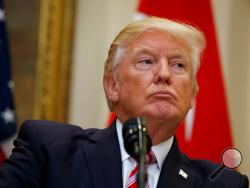WASHINGTON (AP) — President Donald Trump personally appealed to FBI Director James Comey to abandon the bureau's investigation into National Security Adviser Michael Flynn, according to notes Comey wrote after the meeting.
The White House issued a furious denial after the notes were disclosed late Tuesday, near the end of a tumultuous day spent beating back potentially disastrous news reports from dawn to dusk.
The bombshell Comey news came as the beleaguered administration was still struggling mightily to explain Monday's revelation that the president had disclosed highly classified information to the Russian foreign minister and the country's ambassador to the United States.
Defending Trump's actions, officials played down the importance and secrecy of the information, which had been supplied by Israel under an intelligence-sharing agreement, and Trump himself said he had "an absolute right" as president to share "facts pertaining to terrorism" and airline safety with Russia. Yet U.S. allies and some members of Congress expressed concern bordering on alarm.
As for Comey, whom Trump fired last week, the FBI director wrote in a memo after a February meeting at the White House that the new president had asked him to shut down the FBI's investigation of Flynn and his Russian contacts, said a person who had read the memo. The Flynn investigation was part of a broader probe into Russian interference in last year's presidential election.
Comey's memo, an apparent effort to create a paper trail of his contacts with the White House, would be the clearest evidence to date that the president has tried to influence the investigation.
Rep. Jason Chaffetz, Republican chairman of the House oversight committee, sent a letter to the FBI on Tuesday requesting that it turn over all documents and recordings that detail communications between Comey and Trump. He said he would give the FBI a week and then "if we need a subpoena, we'll do it."
The panel's top Democrat, Elijah Cummings of Maryland, a constant Trump critic, called the allegation of Trump pressure on Comey "explosive" and said "it appears like a textbook case of criminal obstruction of justice."
John McCain, chairman of the Senate Armed Services Committee, said late Tuesday that the developments had reached "Watergate size and scale."
Mitch McConnell, the Republican leader of the Senate, said simply, "It would be helpful to have less drama emanating from the White House."
The person who described the Comey memo to the AP was not authorized to discuss it by name and spoke on condition of anonymity. The existence of the memo was first reported Tuesday by The New York Times.
The White House vigorously denied it all. "While the president has repeatedly expressed his view that General Flynn is a decent man who served and protected our country, the president has never asked Mr. Comey or anyone else to end any investigation, including any investigation involving General Flynn," a White House statement said.
Trump fired Flynn on Feb. 13, on grounds that he had misled Vice President Mike Pence and other officials about his contacts with Russians.
The intensifying drama comes as Trump is set to embark Friday on his first foreign trip, which had been optimistically viewed by some aides as an opportunity to reset an administration floundering under an inexperienced president.
When Trump fired Comey, he said he did so based on Comey's very public handling of the Hillary Clinton email probe and how it affected his leadership of the FBI. But the White House has provided differing accounts of the firing. And lawmakers have alleged that the sudden ouster was an attempt to stifle the bureau's investigation into Trump associates' ties to Russia's meddling in the campaign.
Mark Warner of Virginia, top Democrat on the Senate intelligence committee, said he would ask Comey for additional material as part of that panel's investigation. "Memos, transcripts, tapes — the list keeps getting longer," he said.
According to the Times, Comey wrote in the February memo that Trump told him Flynn had done nothing wrong. Comey said he replied that "I agree he is a good guy" but said nothing to Trump about limiting the investigation.
The newspaper said Comey was in the Oval Office that day with other national security officials for a terrorism threat briefing. When that ended, Trump asked everyone to leave except Comey, and he eventually turned the conversation to Flynn.
The administration spent the first half of Tuesday defending Trump's disclosure of classified information to senior Russian officials. National Security Adviser H.R. McMaster said the president's comments were "wholly appropriate." He used that phrase nine times in his briefing to reporters.
The White House has grown suspicious about the volume and timing of the seemingly never-ending stream of leaks about the president, said one senior administration official who spoke on condition of anonymity to reflect on the feeling inside the West Wing. The official questioned why — if Comey had concerns about his conversations with the president — the FBI director hadn't shared them with the deputy director, the Department of Justice and Congress at the time.
The highly classified information about an Islamic State plot was collected by Israel, a crucial source of intelligence and close partner in the fight against some of the America's fiercest threats in the Middle East.
Trump's disclosure of the information threatened to fray that partnership and piled pressure on the White House to explain the apparently on-the-spot decision to reveal the information to Russian diplomats in the Oval Office.
A U.S. official who confirmed the disclosure to The Associated Press said the revelation potentially put the source at risk.
In a statement, Israel's ambassador to the U.S., Ron Dermer, said the partnership between the U.S and Israel was solid.
___
Associated Press writers Vivian Salama and Jill Colvin contributed.

